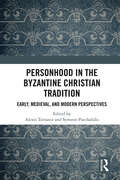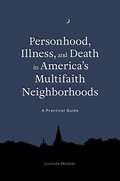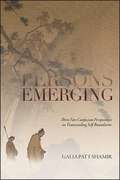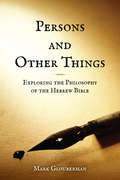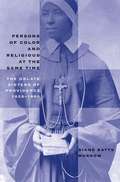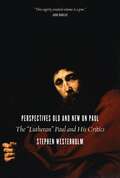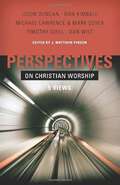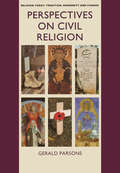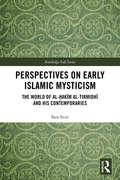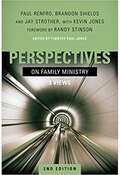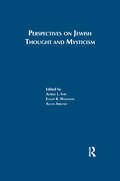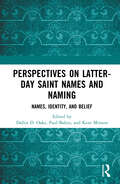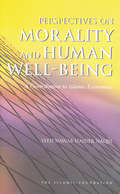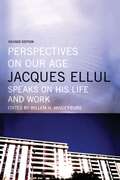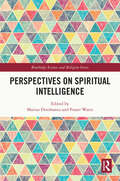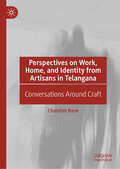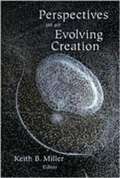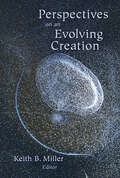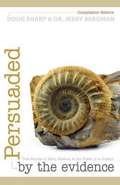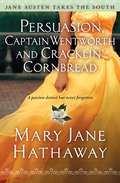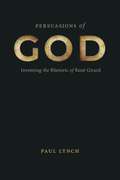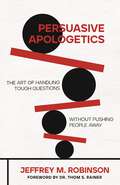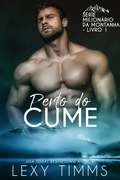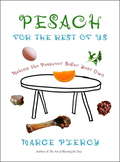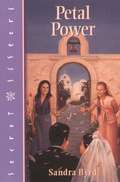- Table View
- List View
Personhood in the Byzantine Christian Tradition: Early, Medieval, and Modern Perspectives
by Alexis Torrance Symeon PaschalidisBringing together international scholars from across a range of linked disciplines to examine the concept of the person in the Greek Christian East, Personhood in the Byzantine Christian Tradition stretches in its scope from the New Testament to contemporary debates surrounding personhood in Eastern Orthodoxy. Attention is paid to a number of pertinent areas that have not hitherto received the scholarly attention they deserve, such as Byzantine hymnography and iconology, the work of early miaphysite thinkers, as well as the relevance of late Byzantine figures to the discussion. Similarly, certain long-standing debates surrounding the question are revisited or reframed, whether regarding the concept of the person in Maximus the Confessor, or with contributions that bring patristic and modern Orthodox theology into dialogue with a variety of contemporary currents in philosophy, moral psychology, and political science. In opening up new avenues of inquiry, or revisiting old avenues in new ways, this volume brings forward an important and on-going discussion regarding concepts of personhood in the Byzantine Christian tradition and beyond, and provides a key stimulus for further work in this field.
Personhood, Illness, and Death in America's Multifaith Neighborhoods: A Practical Guide
by Lucinda MosherIn this interfaith book Lucinda Mosher investigates different understandings of destiny, loss, death, and remembrance in America's many religions. Using stories and interviews with a variety of religious adherents and health professionals, the book wrestles with questions such as: How can our religion guide us in making decisions about certain kinds of medical treatment options? What religion-related issues would it be helpful for a healthcare provider to know? How do different religious traditions help manage our grief? In a globalized society religious traditions sit alongside each other as never before, and the need for religious literacy and multifaith chaplaincy is increasingly recognized. By looking at multireligious America, this book provides an essential exploration of different attitudes to death, helping members of all faith communities to become more literate with each other's religious traditions.
Persons Emerging: Three Neo-Confucian Perspectives on Transcending Self-Boundaries (SUNY series in Chinese Philosophy and Culture)
by Galia Patt-ShamirOffers three neo-Confucian understandings of broadening the Way as broadening oneself, through an ongoing process of removing self-boundaries.Persons Emerging explores the renewed idea of the Confucian person in the eleventh-century philosophies of Zhou Dunyi, Shao Yong, and Zhang Zai. Galia Patt-Shamir discusses their responses to the Confucian challenge that the Way, as perfection, can be broadened by the person who travels it. Suggesting that the three neo-Confucian philosophers undertake the classical Confucian task of "broadening the way," each proposes to deal with it from a different angle: Zhou Dunyi offers a metaphysical emerging out of the infinitude-finitude boundary, Shao Yong emerges out of the epistemological boundary between in and out, and Zhang Zai offers a pragmatic emerging out of the boundary between life and death.Through the lens of these three Song-period China philosophers, the idea of "transcending self-boundaries" places neo-Confucian philosophies within the global philosophical context. Patt-Shamir questions the Confucian notions of person, Way, and how they relate to human flourishing to highlight how the emergence of personhood demands transcending metaphysical, epistemological, and moral self-boundaries.
Persons and Other Things: Exploring the Philosophy of the Hebrew Bible
by Mark GloubermanThe Hebrew Bible is a philosophical testament. Abraham, the first biblical philosopher, calls out to the world in God’s name exactly as Plato calls out in the name of the Forms. Abraham comes forward as a critic of pagan thought about, specifically, persons. Moses, to whom the baton is passed, spells out the practical implications of the Bible’s core anthropological teachings. In Persons and Other Things Mark Glouberman explores the Bible’s philosophy, roughing out in the course of a defence of it how men and women who see themselves in the biblical portrayal (as he argues that most of us do once the "religious" glare is reduced) are committed to conduct their personal affairs, arrange their social ties, and act in the natural world. Persons and Other Things is also the author’s testament about the practice of philosophy. Glouberman sets out the lessons he has acquired as a lifelong learner about thinking philosophically, about writing philosophy, and about philosophers.
Persons of Color and Religious at the Same Time
by Diane Batts MorrowFounded in Baltimore in 1828 by a French Sulpician priest and a mulatto Caribbean immigrant, the Oblate Sisters of Providence formed the first permanent African American Roman Catholic sisterhood in the United States. It still exists today. Exploring the antebellum history of this pioneering sisterhood, Diane Batts Morrow demonstrates the centrality of race in the Oblate experience.By their very existence, the Oblate Sisters challenged prevailing social, political, and cultural attitudes on many levels. White society viewed women of color as lacking in moral standing and sexual virtue; at the same time, the sisters' vows of celibacy flew in the face of conventional female roles as wives and mothers. But the Oblate Sisters' religious commitment proved both liberating and empowering, says Morrow. They inculcated into their communal consciousness positive senses of themselves as black women and as women religious. Strengthened by their spiritual fervor, the sisters defied the inferior social status white society ascribed to them and the ambivalence the Catholic Church demonstrated toward them. They successfully persevered in dedicating themselves to spiritual practice in the Roman Catholic tradition and their mission to educate black children during the era of slavery.
Perspectives Old and New on Paul: The "Lutheran" Paul and His Critics
by Stephen WesterholmHere, finally, is a much-needed review and analysis of the divergent interpretations of Paul. With a clear head and winsome sense of humor, Stephen Westerholm compares the traditional understanding of Paul to more recent readings, drawing on the writings of key figures in the debate both past and present.Westerholm first offers a detailed portrait of the "Lutheran" Paul, including the way such theologians as Augustine, Luther, Calvin, and Wesley have traditionally interpreted "justification by faith" to mean that God declares sinners "righteous" by his grace apart from "works." Westerholm then explores how Paul has fared in the twentieth century, in which "New Perspective" readings of Paul see him teaching that Gentiles need not become Jews or observe Jewish law to be God's people. The final section of the book looks anew at disputed areas of Paul's theological language and offers compelling discussion on the place of both justification by faith and Mosaic law in divine redemption.
Perspectives on Christian Worship: Five Views
by Dan Kimball Dan Wilt Timothy Quill Ligon Duncan Michael Lawrence & Mark DeverPerspectives on Christian Worship presents in counterpoint form five basic common beliefs on Christian worship that have developed over the course of church history with a view toward determining which is most faithful to Scripture. Each chapter is written by a prominent person within each tradition, and each writer has the opportunity to respond to each differing view.
Perspectives on Civil Religion: Volume 3 (Routledge Revivals)
by Gerald ParsonsThis title was first published in 2002: Perspectives on Civil Religion introduces the concept of civil religion, examines the use of the concept in recent scholarship and investigates examples of civil religion in the contemporary world. The book sets out to explore tensions and complexities in the relationship between the 'sacred' and the 'secular', and draws on two major case studies for in-depth illustration of key issues. It looks first at the development of rituals of remembrance from the American civil war, British and American responses to the two world wars and the controversial Vietnam Veterans Memorial in Washington. It then considers civil religion in the Italian city of Siena, especially in relation to the Palio of Siena and Sienese devotion to the Virgin. The five textbooks and Reader that make up the Religion Today Open University/Ashgate series are: From Sacred Text to Internet; Religion and Social Transformations; Perspectives on Civil Religion; Global Religious Movements in Regional Context; Belief Beyond Boundaries; Religion Today: A Reader
Perspectives on Early Islamic Mysticism: The World of al-Ḥakīm al-Tirmidhī and his Contemporaries (Routledge Sufi Series)
by Sara SviriThis monograph explores the original literary produce of Muslim mystics during the eighth–tenth centuries, with special attention to nineteenth-century mystics, such as al-Tustarī, al-Muḥāsibī, al-Kharrāz, al-Junayd and, in particular, al-Ḥakīm al-Tirmidhī. Unlike other studies dealing with the so-called ‘Formative Period’, this book focuses on the extant writings of early mystics rather than on the later Ṣūfī compilations. These early mystics articulated what would become a hallmark of Islamic mysticism: a system built around the psychological tension between the self (nafs) and the heart (qalb) and how to overcome it. Through their writings, already at this early phase, the versatility, fluidity and maturity of Islamic mysticism become apparent. This exploration thus reveals that mysticism in Islam emerged earlier than customarily acknowledged, long before Islamic mysticism became generically known as Ṣūfism. The central figure of this book is al-Ḥakīm al-Tirmidhī, whose teaching and inner world focus on themes such as polarity, the training of the self, the opening of the heart, the Friends of God (al-awliyāʾ), dreams and visions, divine language, mystical exegesis and more. This book thus offers a fuller picture than hitherto presented of the versatility of themes, processes, images, practices, terminology and thought models during this early period. The volume will be a key resource for scholars and students interested in the study of religion, Ṣūfī studies, Late Antiquity and Medieval Islam.
Perspectives on Family Ministry: 3 Views
by Timothy Paul JonesEvery church is called to some form of family ministry, but this calling requires far more than adding another program to an already-packed schedule. The most effective family ministries refocus every church process to engage parents in discipling their children and to draw family members together instead of pulling them apart. <p><p> In this second edition, Jones expands the definition of family ministry, and broadens the book's focus to address urban perspectives and family ministry in diverse settings.
Perspectives on Jewish Though
by IvryFirst Published in 1998. Routledge is an imprint of Taylor & Francis, an informa company.
Perspectives on Latter-day Saint Names and Naming: Names, Identity, and Belief
by Dallin D. Oaks Paul Baltes Kent MinsonPerspectives on Latter-day Saint Names and Naming approaches cultural, historical, and doctrinal dimensions of The Church of Jesus Christ of Latter-day Saints through a fresh lens that explores how these dimensions intersect with names and naming. Featuring a collection of chapters from multiple authors, its bipartite structure examines fascinating topics in relation to the Church, looking first at cultural and historical perspectives before analyzing doctrinal and scriptural perspectives. The book discusses such matters as how contemporary naming practices of Latter-day Saints compare to those outside the faith, how code names were used in one of the faith’s books of scripture to protect Church leaders from persecution, and how names and naming relate to the covenant identity of Church members. Through its fresh approach to understanding religious identity and belief in relation to The Church of Jesus Christ of Latter-day Saints, this book is an invaluable resource for scholars and students of Mormon studies and will also be of interest to people with a fascination with names and naming issues as those occur in a variety of settings, including religious ones.
Perspectives on Morality and Human Well-Being
by Syed Nawab Haider NaqviThis book explores in detail the proposition that (private) morality, especially religious morality, is vital for achieving economic well-being and human happiness; and that this linkage would be even stronger in an Islamic economy. The book highlights the need for an active interaction between religion, morality and economics in general and in an (idealized) Islamic economy in particular. ProfessorSyed Nawab Haider Naqvihas an MA from Yale University and a PhD from Princeton University. He did his post-doctoral work at Harvard University.
Perspectives on Our Age: Jacques Ellul Speaks on his Life and Work
by Jacques EllulOriginally broadcast on CBC Radio's Ideas as a series of interviews, Jacques Ellul's first-person approach here makes his ideas accessible to readers looking for new ways of understanding our society, and also gives unique new insight into Ellul's life, his work, and the origins and development of his beliefs and theories. Jacques Ellul, historian, theologian, and sociologist, was one of the foremost and widely known contemporary critics of modern technological society.
Perspectives on Spiritual Intelligence (Routledge Science and Religion Series)
by Fraser Watts Marius DorobantuThe topic of intelligence involves questions that cut deep into ultimate concerns and human identity, and the study of intelligence is an ideal ground for dialogue between science and religion. This volume investigates the notion of spiritual intelligence from a variety of perspectives, bringing together contributions from theology, computer science, linguistics, psychology, biology, and cognitive science. It defines spiritual intelligence as “processing things differently, not processing different things” and aims to describe it in naturalistic terms. Spiritual intelligence is not regarded as a separate mental module or a magical ability to interact with the supernatural but rather as a specific, more spiritual way of engagement with reality, which has observable cognitive, phenomenal, and linguistic characteristics. The book is valuable reading for those working at the interface between science and spirituality.
Perspectives on Work, Home, and Identity From Artisans in Telangana: Conversations Around Craft
by Chandan BoseProviding an ethnographic account of the everyday life of a household of artisans in the Telangana state of southern India, Chandan Bose engages with craft practice beyond the material (in this case, the region's characteristic murals, narrative cloth scrolls, and ritual masks and figurines). In situating the voice of the artisans themselves as the central focus of study, simultaneous and juxtaposing histories of craft practice emerge, through which artisans assemble narratives about work, home, and identity through multiple lenses. These perspectives include: the language artisans use to articulate their experience of materials, materiality, and the physical process of making; the shared and collective memory of practitioners through which they recount the genealogy of the practice; the everyday life of the household and its kinship practices, given the integration of the studio-space and the home-space; the negotiations between practitioners and the nation-state over matters of patronage; and the capacities of artisans to both conform to and affect the practices of the neo-liberal market.
Perspectives on an Evolving Creation
by Keith B. MillerAccording to the authors of this book, who explore evolutionary theory from a clear Christian perspective, the common view of conflict between evolutionary theory and Christian faith is mistaken. Written by contributors representing the natural sciences, philosophy, theology, and the history of science, this thought-provoking work is informed by both solid scientific knowledge and keen theological insight. The three sections of the book address (1) relevant biblical, historical, and scientific background, (2) the scientific evidence for an evolving creation, and (3) theological issues commonly raised in connection with evolution, including the nature of God's creative activity, the meaning of the miraculous, and the uniqueness of humankind. Woven through the volume are short meditations designed to direct readers toward worshiping the God of providence.
Perspectives on an Evolving Creation
by Keith B. MillerAccording to the authors of this book, who explore evolutionary theory from a clear Christian perspective, the common view of conflict between evolutionary theory and Christian faith is mistaken. Written by contributors representing the natural sciences, philosophy, theology, and the history of science, this thought-provoking work is informed by both solid scientific knowledge and keen theological insight. The three sections of the book address (1) relevant biblical, historical, and scientific background, (2) the scientific evidence for an evolving creation, and (3) theological issues commonly raised in connection with evolution, including the nature of God's creative activity, the meaning of the miraculous, and the uniqueness of humankind. Woven through the volume are short meditations designed to direct readers toward worshiping the God of providence.Contributors: Laurie J. Braaten Warren S. Brown Jr. David Campbell Robin Collins Edward B. Davis Terry M. Gray Jeffrey K. Greenberg Deborah B. Haarsma Loren Haarsma James P. Hurd Conrad Hyers David N. Livingstone Keith B. Miller John C. Munday Jr. George L. Murphy Mark A. Noll Robert John Russell Howard J. Van Till David L. Wilcox Jennifer Wiseman
Persuaded by the Evidence
by Dr Jerry Bergman Doug SharpTrue Stories of Faith, Science, & the Power of a Creator A unique and interesting collection of true stories from Christians - each sharing his personal journey to find the biblical truth of a six-day creation! From scientists in the midst of complex research to youth ministers, and more, see how each began at a different point and place in his life to question the supposed truth of evolution and how faith and actual evidence led to his embracing a creation-based, biblical world-view. In their testimonies, you will read about their search for answers, often unavailable through their school, their church, or scientific knowledge - and how the discoveries they made have shaped their faith and changed their lives. Seeking answers for yourself? Discover the powerful truths these individuals now share - and find yourself also persuaded by the evidence! Contributors include: Carl Kerby, Curt Sewell, Dr. Walter T. Brown, Dr. Raymond Damadian, Frank Sherwin, and more! Stories Focus on: Powerful testimonies of the concept of a creator Discovering creation truths within scientific careers Understanding the relevance of Genesis to your personal faith Finding answers to life's toughest questions through understanding Genesis Appreciating the powerful influence of creation believers and scholars Features a "Founding Fathers of Creationism" special section focused on Dr. Henry Morris, Dr. John Whitcomb, Dr. Andrew Snelling, and more. Special spotlight! Short biography of Dr. Mortimer Adler, chairman of the board of editors of Encyclopedia Britannica for many years
Persuasion, Captain Wentworth and Cracklin' Cornbread (Jane Austen Takes the South #3)
by Mary Jane HathawayA lively Southern retelling of Jane Austen’s Persuasion, featuring Lucy Crawford, who is thrown back into the path of her first love while on a quest to save her beloved family home.Lucy Crawford is part of a wealthy, well-respected Southern family with a long local history. But since Lucy’s mother passed away, the family home, a gorgeous antebellum mansion, has fallen into disrepair and the depth of her father’s debts is only starting to be understood. Selling the family home may be the only option—until her Aunt Olympia floats the idea of using Crawford house to hold the local free medical clinic, which has just lost its space. As if turning the plantation home into a clinic isn’t bad enough, Lucy is shocked and dismayed to see that the doctor who will be manning the clinic is none other than Jeremiah Chevy—her first love. Lucy and Jeremiah were high school sweethearts, but Jeremiah was from the wrong side of the tracks. His family was redneck and proud, and Lucy was persuaded to dump him. He eventually left town on a scholarship, and now, ten years later, he’s returned as part of the rural physician program. And suddenly, their paths cross once again. While Lucy’s family still sees Jeremiah as trash, she sees something else in him—as do several of the other eligible ladies in town. Will he be able to forgive the past? Can she be persuaded to give love a chance this time around?
Persuasions of God: Inventing the Rhetoric of René Girard (RSA Series in Transdisciplinary Rhetoric)
by Paul LynchThe nations of the global north find themselves in a post-secular or post-Christian period, one in which the practice, expression, and effects of religion are undergoing massive shifts. In Persuasions of God, Paul Lynch pursues a project of “theorhetoric,” a radical new approach to speaking about the divine. Searching for new religious forms amid the lingering influence of Christianity, Lynch turns to René Girard, the most important twentieth-century thinker on the sacred and its expression within the Christian tradition. Lynch repurposes Girard’s mimetic theory to invent a post-Christian way of speaking to, for, and especially about God. Girard theorized the sacred as the nexus of violence, order, and sacralization that lies at the heart of religion. What Lynch advocates in our current moment of religious kairos is a paradoxically meek rhetoric that conscientiously refuses rivalry, actively exploits tradition through complicit invention, and boldly seeks a holiness free of exclusionary violence. The project of theorhetoric is to reinvent God through the reimagined themes of meekness, sacrifice, atonement, and holiness. From these, Persuasions of God offers religion reimagined for our post-secular age.An interdisciplinary mix of philosophy, sociology, rhetorical studies, and theology, this book draws on mimetic theory to answer the question of where religion goes next. It will be valued by religious studies and communications scholars as well as anyone interested in the future of Christianity in our modern world.
Persuasive Apologetics: The Art of Handling Tough Questions without Pushing People Away
by Jeffrey M. RobinsonWe cannot love others well without speaking the truthLoving our neighbors well includes engaging in robust conversations that destabilize false belief systems. In addressing the mind, will, and emotions of actual, complex people, Christian believers must develop various approaches to meet diverse personalities and multiple connection points. In Persuasive Apologetics, pastor and professor Jeffrey M. Robinson explores what's below the surface of intellectual-sounding objections to Christianity. He shows what it means to contend for the truth through real-life examples of communicating with those who hold differing beliefs. Robinson covers foundational and practical issues, such as • the importance of demeanor in being persuasive • various apologetic approaches • the influence of worldview presuppositions • using undercutting defeaters to expose faulty thinking • causes of nonbelief • the historical Jesus compared with figureheads of competing belief systems • the hope that Jesus offers Persuasive Apologetics will challenge serious seekers to peel back the layers of skeptical arguments and equip committed Christians looking to hone their apologetics skills.
Perto do Cume (Série Milionário da Montanha - Livro 1 #1)
by Lexy TimmsEscale a montanha para que você possa ver o mundo, não para que o mundo possa ver você. No fim, tudo que aprendi foi como ser forte. Sozinho. Lincoln é um ex-Seal da Marinha, que se encontra escondido nas montanhas do Oregon. Ele quer viver sua vida longe das pessoas. Ele está feliz sozinho, preferindo a paz e tranquilidade. No entanto, os demônios do seu passado ainda o assombram... Um dia, ele se depara com Pearl, uma jovem que está em uma aventura de caminhada sozinha, que se machuca gravemente e precisa da sua ajuda. Seu ferimento e uma tempestade de neve a obrigam a se abrigar com ele em sua cabana minúscula. As coisas esquentam entre eles, mas ele nunca revela quem realmente é e por que vive sozinho. Lincoln pode controlar seus desejos ou permitirá que os fantasmas do passado o alcancem? Série Milionário da Montanha Perto do Cume Crossing the Bluff Climbing the Mount
Pesach for the Rest of Us: Making the Passover Seder Your Own
by Marge PiercyEvery year, poet and novelist Marge Piercy creates her own Passover seder with a group of family and friends. Babies have been born and grown up, friends have moved or divorced, but the principals continue to gather in her rustic Cape Cod home to participate in a seder that Piercy takes joy in tweaking each spring to make it more meaningful. In this journey through the ritual, Piercy coaxes us toward “a significant contemporary interpretation, rather than an emphasis on what is strictly ‘correct’ or traditional. ” She reminisces about her grandmother, who thought herself unworthy to lead a seder because of her limited Hebrew but presided “morally” at the table; she urges adding an orange to the seder plate; she even describes her heroic efforts to make her own gefilte fish (an experiment not to be repeated). Piercy offers her distinct slant on each element of the feast and provides dozens of her own wonderful recipes, which she delivers in the same warm, commanding voice as is heard in her poems and prose: “When I told Ira that I was going to explain how to cook matzoh brei, he thought I was crazy. Everybody knows how to make matzoh brei, he said. But I am of the opinion that there is no longer anything that everybody knows how to cook. ” It is in that spirit–no question too simple–that Piercy welcomes readers to her kind of seder: a homemade and personal affair, the kind we all wish we could attend. This charming and instructive book of Passover wisdom, brimming with favorite dishes and Marge Piercy’s own moving Passover poems and blessings, invites us to look at an important Jewish ritual in a whole new way.
Petal Power
by Sandra ByrdBook Eight in the Secret Sisters Series! Tess and Erin's teacher planned the perfect wedding--but now something's gone very wrong. Can the Secret Sisters save the day? Ms. Martinez, Tess and Erin's sixth-grade teacher, has planned a storybook wedding, and the whole class is invited! Some of the kids even offer to pitch in and help. But when Tess and Erin discover their beloved teacher crying after school--and learn the reason why--they make up their minds to do even more. At first, Tess's idea seems like a good one...even when it involves "stretching" the truth a bit. But soon it becomes clear to the girls that there's no such thing as a "helpful" white lie. Is there nothing they can do? Or can the Secret Sisters save the wedding flowers--and maybe the honeymoon--after all?
